A glimpse of glory: When domestiques have their day
Victories for Chad Haga, Paolo Tiralongo, Blel Kadri, Stijn Devolder and more

This article is part of 'Domestique Week' on Cyclingnews. For all our stories so far, click here.
Domestiques are the often unsung heroes of the cycling world, putting in the long hours at the front of the peloton, fetching bidons, and chasing down attacks for their team leaders.
They get recognition for their hard work, but sometimes they also get their own chances to go for victory. While those chances may be few and far between, sometimes they pay off in a big way.
Here, we look at some of the riders who, in recent years, have managed to add a big win or two to their palmarès to go with a career's worth of work for others.
Alan Marangoni
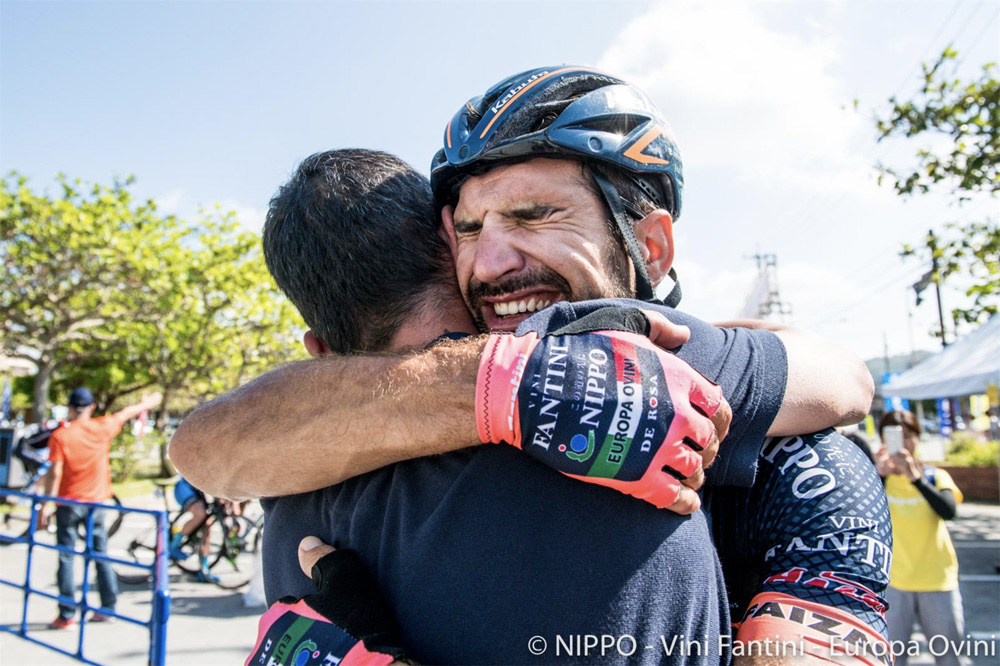
The Italian had to wait a long time for his only victory. After turning pro in 2009, he rode as a domestique for 10 years across four teams, his career focussed on working for others. 2011 was perhaps his best year, as he placed third in the time trial at the National Championships and helped Liquigas leader Vincenzo Nibali to a Giro d'Italia podium finish.
He had a brush with glory at the 2015 Giro, making an all-Italian break on the flat stage 15 to Forlì. He made his move just over a kilometre out, but was painfully chased down inside the final 200 metres and ended up fourth as Nicola Boem triumphed.
The race was one of seven Grand Tours Marangoni completed during his career, for CSF-Navigare, Liquigas and the merged Cannondale squad. His biggest moment, however, came for Nippo-Vini Fantini in November 2018. Yes, it was the final race of his career, the Tour of Okinawa.
Get The Leadout Newsletter
The latest race content, interviews, features, reviews and expert buying guides, direct to your inbox!
It was a fairy-tale ending for the career-long worker, making the break of the day in Japan before putting in a late attack to solo over the line ahead of BMC stagiaire Freddy Ovett and Chun Kai Feng (Bahrain-Merida).
"It was the perfect day I’ve always looked for in my career and I found it today," Marangoni said after the finish, understandably emotional after finishing his career with his first win.
"I took the risk of attacking in the last kilometres because I wanted to play all my cards to try and finally achieve the goal I’ve chased for so long during my career.
"I think a made a perfectly timed attack and it seemed like I was dreaming or watching a movie about someone else. It was already a special day for me and to cross the line with my arms in the air and win was incredibly emotional."
| Row 0 - Cell 0 |
Blel Kadri
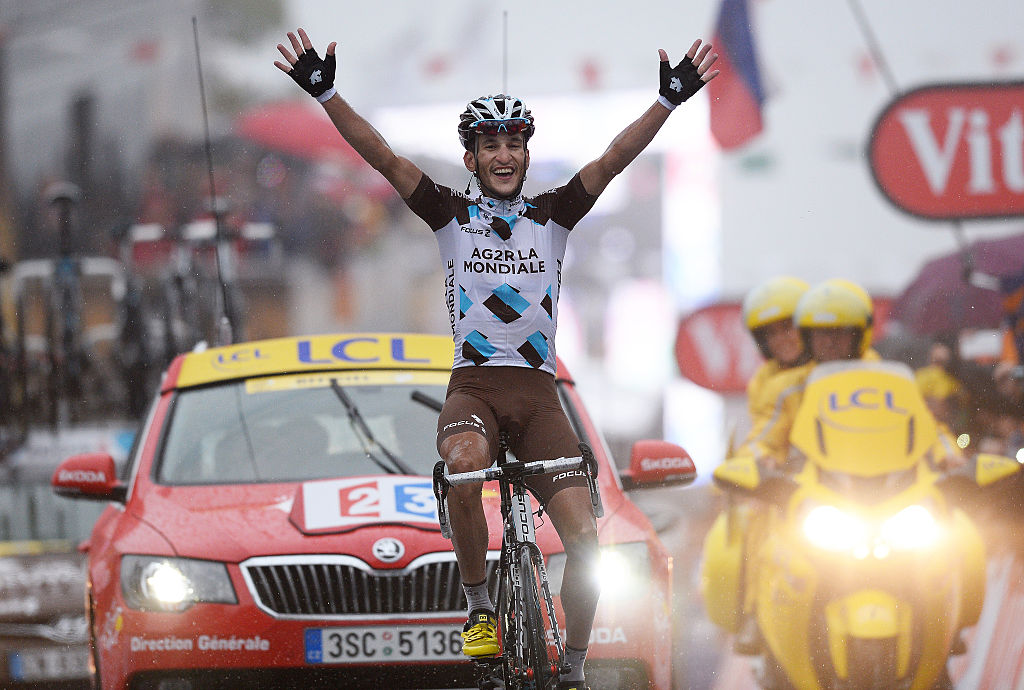
Kadri spent his eight-year professional career riding for one squad – AG2R La Mondiale – and was a key worker for team leaders Jean-Christophe Péraud and John Gadret across four Tour de France participations.
He had his own days in the sun, though, during the 2013 and 2014 seasons. In March 2013 he only started at the now-defunct Roma Maxima after teammate Steve Chainel pulled out ill. Later that afternoon, after spending 127 of the race's 180km out in the break, he took victory alone in Rome, near the Coliseum.
The combativity award on stage 2 of the Tour de France followed, though his biggest triumph was to come at the 2014 race. Another offensive showing on stage 2 there bagged him another combativity prize, but it was on the road to Gerardmer on stage 8 where he enjoyed his greatest hour.
Kadri had made the five-man move of the day, joining some big names like neo-pro Simon Yates, Sylvain Chavanel and Niki Terpstra. The largely flat stage saw the break gain up to 11 minutes on the peloton at one point, though the finale took in two second-category climbs and a finishing third-category ramp.
Chavanel went first, 25km out, though Kadri was quick to respond on the Col de la Croix des Moinats and then left his breakmates behind. He rode the final 20km solo, finishing 2:17 up on the peloton and receiving congratulations from French President Francois Hollande after the finish.
Kadri wore the king of the mountains jersey the next day and went on to finish 84th overall at the race. He'd ride on for two more years, and after retirement took up work in the cycling department of a Décathlon store near Toulouse.
| Row 0 - Cell 0 |
Stijn Devolder
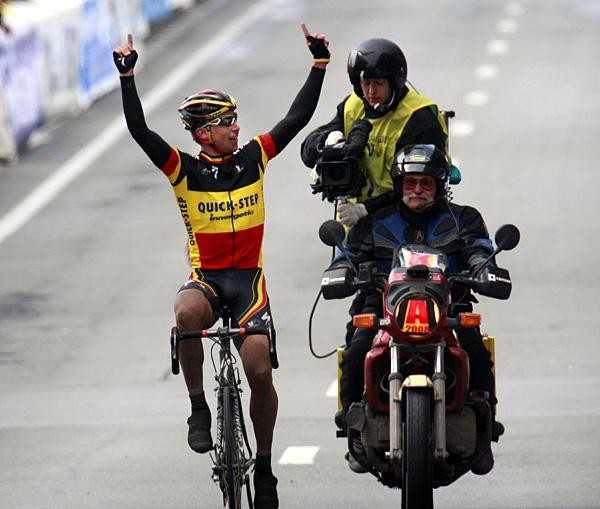
It would be wrong to characterise Devolder as a lifelong domestique like some of the other men on our list. The Belgian took plenty of chances to ride for himself through his career, including victories at the Tour of Belgium, Tour of Austria, Volta ao Algarve and the Belgian National Championships, as well as top placings at the Vuelta, numerous Classics and stage races.
But heading into the 2008 Classics season, he was at the service of Tom Boonen, the 2005 world champion who already had a Paris-Roubaix and two Tour of Flanders titles to his name. Devolder, meanwhile finished on the podium at E3 Harelbeke in 2003 and won Driedaagse De Panne in 2006, so there was no question about team leadership come the 2008 edition of the Tour of Flanders.
Devolder was in top form that day, working at the head of the peloton on the Leberg to push on with Philippe Gilbert. More big names followed in the shape of Sebastian Langeveld, Karsten Kroon, George Hincapie and Alessandro Ballan, while Devolder sat on the back with Boonen behind.
Resplendent in his tricolor jersey, Devolder jumped away on the Eikenmolen, 25km from the line. He wouldn't be caught again, despite Thor Hushovd leading an initial chase move and then an elite group forming just 16 seconds behind him on the Muur with 16km to go.
Devolder hung on though, despite the strength of the group behind. It was the greatest day of his career, even if he would repeat the feat a year later.
"It was always my dream to win the Ronde van Vlaanderen as Belgian champion, and now that dream has come true. I still can't believe it," he said after the race. " I attacked because I knew it was a tailwind until the Muur," Devolder recalled.
"When I had 15 seconds, after the Muur, I thought that they would fly past me on the Bosberg, but apparently they weren't that fresh behind me."
Devolder retired at the end of a 2019 season spent with Corendon-Cirus, and now sells agricultural machinery.
| Row 0 - Cell 0 |
Paolo Tiralongo
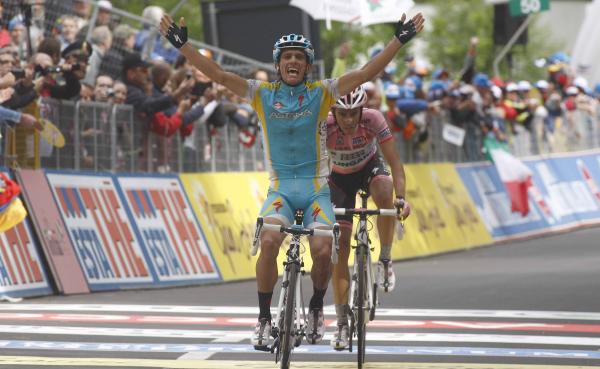
Best known throughout his career as a mountain domestique for Giro d'Italia contenders Damiano Cunego and Vincenzo Nibali, the Bee from Avola tasted glory for himself at the race on three occasions.
The first was a long time coming, though, 11 years into his pro career at the age of 33. He had podium places to his name in the past – second and third in 2003 and 2006, respectively, but the summit finish of Macugnaga in 2011 saw him finally break his duck, taking his first ever pro victory.
Tiralongo, then riding for eventual young rider's classification winner Roman Kreuziger, had attacked 6km from the finish on the third-category climb, which at 28km long and with a final 10km averaging six per cent, it was tougher than the category suggested.
The break was already caught, and Danilo Di Luca was working on the front for Katusha. Di Luca had chased down Tiralongo a kilometre before, but the Astana man pushed on again as the GC men watched one another.
His advantage grew to almost 30 seconds heading into the final two kilometres, until race leader Alberto Contador flew past the attacks of Joaquim Rodríguez and Hubert Dupont to catch Tiralongo with 500 metres to go.
What followed was a beautiful moment between the Spaniard and the man who was his teammate the previous year. Contador immediately rode on the front of the duo, exchanging words with the Italian, before peeling off in the closing hundred metres.
"After a life as a domestique, I’ve finally reached my goal of winning a race," he told RAI television cameras after crossing the line, arms aloft. "It was Alberto who suggested to me to attack with six kilometres to go. He touched my shoulder to give me the signal. He had seen my motivation before.
"I had tried to go away once before. This was my only week of freedom. Otherwise, I always give 100 per cent for my captains. I can imagine that 90 per cent of the riders are very happy that I’ve won today after seeing me racing for my captains for such a long time. The first of them is Contador. When I saw him coming across to me, I saw a friend, not a rival. I knew he would do what he could to make me win this stage."
| Row 0 - Cell 0 |
Chad Haga
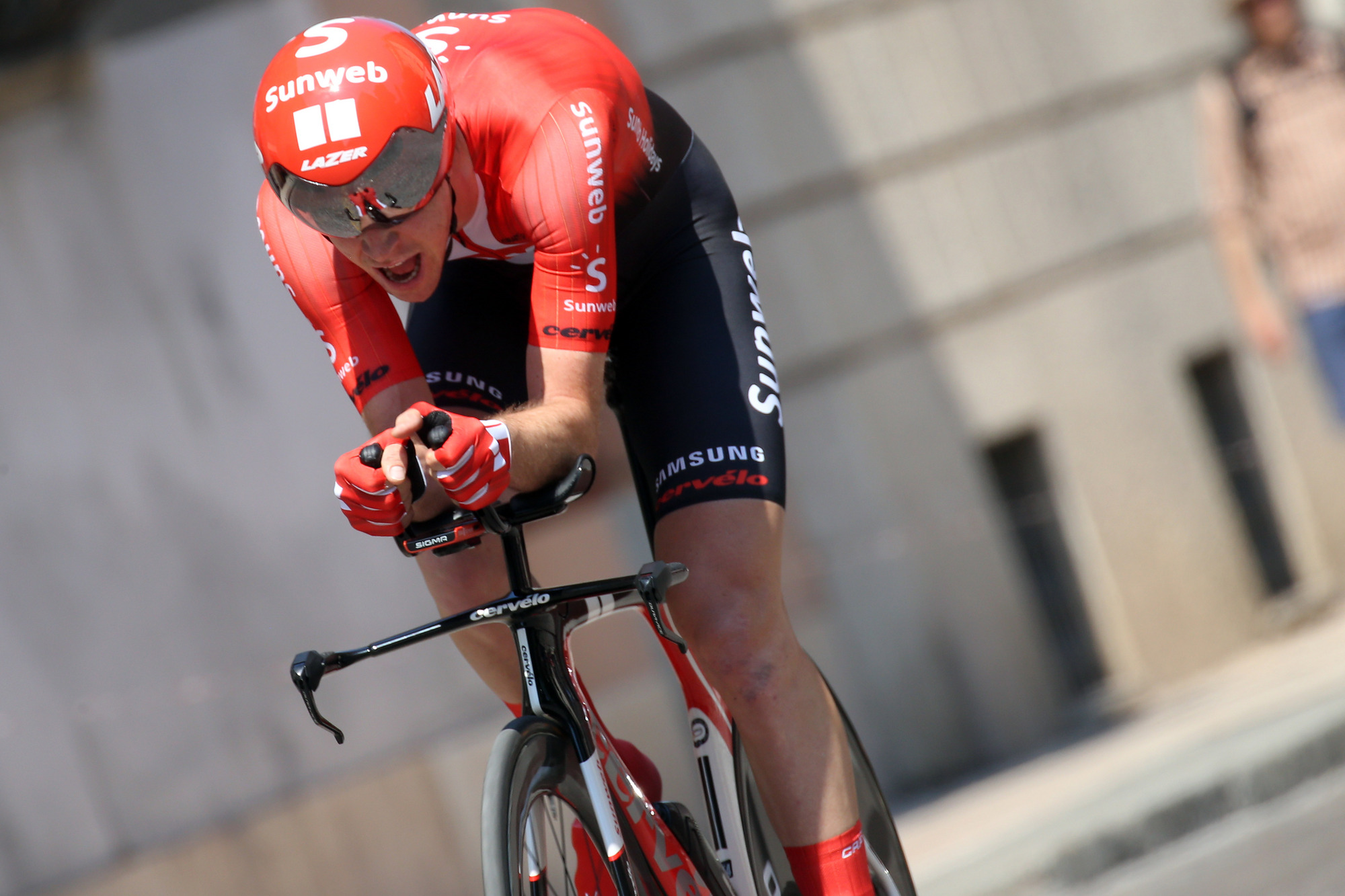
American time trial specialist Haga has been a stalwart at Team Sunweb since turning pro with the German squad back in 2014. The bulk of his time there has been spent in service of others, notably at the 2017 Giro d'Italia, where he was among the team to help Tom Dumoulin take overall victory.
Being a time trialist, of course, means that there are always certain days where a domestique can ride for themselves, in contrast to a lead out man or climbing specialist. While mid-race time trials often see riders having to conserve energy, the final day tests are usually free-for-alls, providing the man has enough energy to go for it after 20 days of racing.
That's exactly what Haga did in 2019, at the end of a brutally hard Giro d'Italia for the team. Dumoulin had abandoned on stage 5 with a knee injury, while three more of the team's riders were forced to abandon before Verona, too.
Haga's sixth place in the mid-race San Marino time trial was the squad's top result since Dumoulin's departure, and the American spent days in the gruppetto after helping his teammates make moves early on the latter stages of the race.
The plan in place – to save energy for that final stage – was working by stage 20. Haga was feeling good on the five-mountain stage, recording in his Cyclingnews blog that he told his DS: "These legs can win tomorrow, I just need to get them to the finish today."
And win he did. "When this golden opportunity fell into my lap with Tom Dumoulin’s departure, I made sure that nothing was left to chance," he wrote. "The team staff matched my commitment to make sure I had the best race possible."
Haga took to the hot seat early on after topping the timing boards, remaining there for hours afterwards. There were nerves as the Lotto Soudal duo of Thomas De Gendt and Victor Campenaerts came within a handful of seconds of his 22:07 time, while GC contender Primož Roglič simply didn't have enough left in the tank to overhaul the then 30-year-old.
"When the moment came that I knew I had just won a stage of the Giro d’Italia, the emotional dam broke," Haga wrote. "Amid the joy and relief, I also grieved at the knowledge that there would be no congratulatory call from my dad. All of that, on a global broadcast no less, is hard to process, hence the constant head-shaking.
"I made sure to soak in the award ceremony, sharing a moment with my dad, who was certainly high-fiving everyone within reach up in heaven. It is a memory that I will always cherish, partly because it was so long in coming."
| Row 0 - Cell 0 |
Iljo Keisse
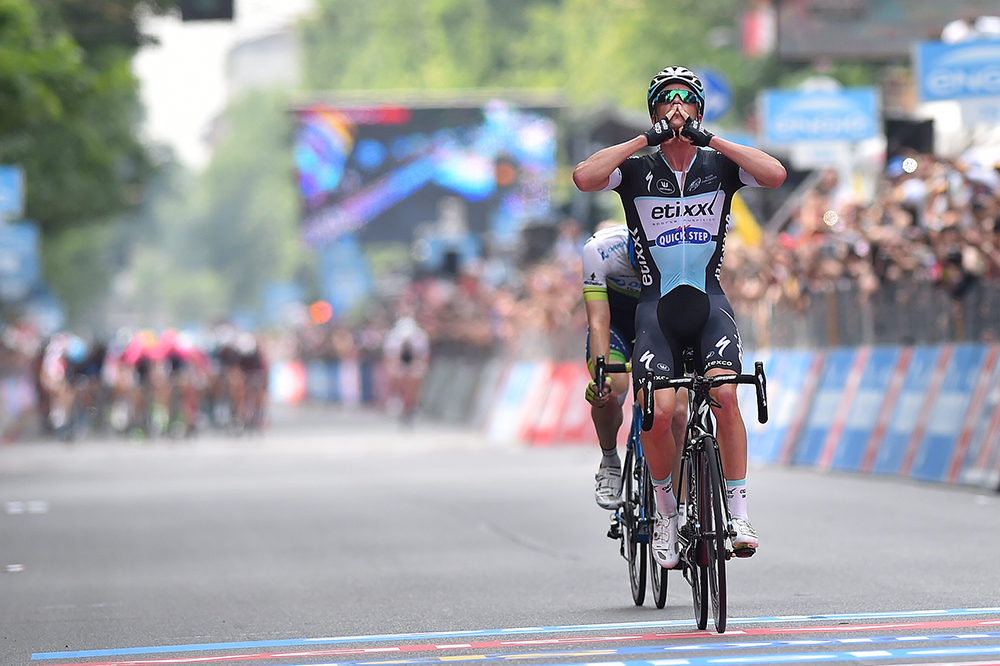
Deceuninck-QuickStep worker Iljo Keisse has five victories to his name during his 17-year career, of which 11 years have been spent with the powerhouse squad. The Belgian has been a fixture of the team's Classics squads since joining, assisting numerous victories over the past decade.
He was there for three Roubaix victories (Tom Boonen, Nicki Terpstra, Philippe Gilbert) and two in Flanders (Gilbert and Terpstra), as well as numerous other Classics, including the team's wins at Omloop Het Nieuwsblad, Kuurne-Brussel-Kuurne, E3 BinckBank Classic and Scheldeprijs in 2019.
For Keisse though, personal glory has largely come on the track and Six Day races, where he has racked up over 20 wins at the likes of Ghent, Rotterdam, Grenoble and Amsterdam over the years.
On the road, his greatest moment came at the 2015 Giro d'Italia, with a dramatic victory on the final day of the race. A flat, ceremonial affair usually reserved for the sprinters, the 185km ride from Turin to Milan saw Keisse get away with Luke Durbridge to animate the seven laps of the finishing circuit.
Nobody would've expected just over four hours of racing would result in anything other than a sprint finish, but the pair managed to spoil the party.
Though they never took more than a minute on the peloton over the 38km they were out front, some indecision among the chasing teams behind allowed the pair to contest the finish, and it was there that Keisse's track nous paid off – even against Durbridge, himself a track rider.
Keisse hung on the wheel of the Australian as the finish line neared, both launching their sprints at the same time before the Belgian came around to take the win.
"This is my best, best victory ever. I'm really happy," said Keisse after his victory. "I'm a track rider and I know I can do well in short crits like this with fast corners. I was also lucky to have the perfect mate in the break with Luke Durbridge. On the last lap I knew I was riding for the win, I just had to come to sprint and take it."
| Row 0 - Cell 0 |
Johan Vansummeren
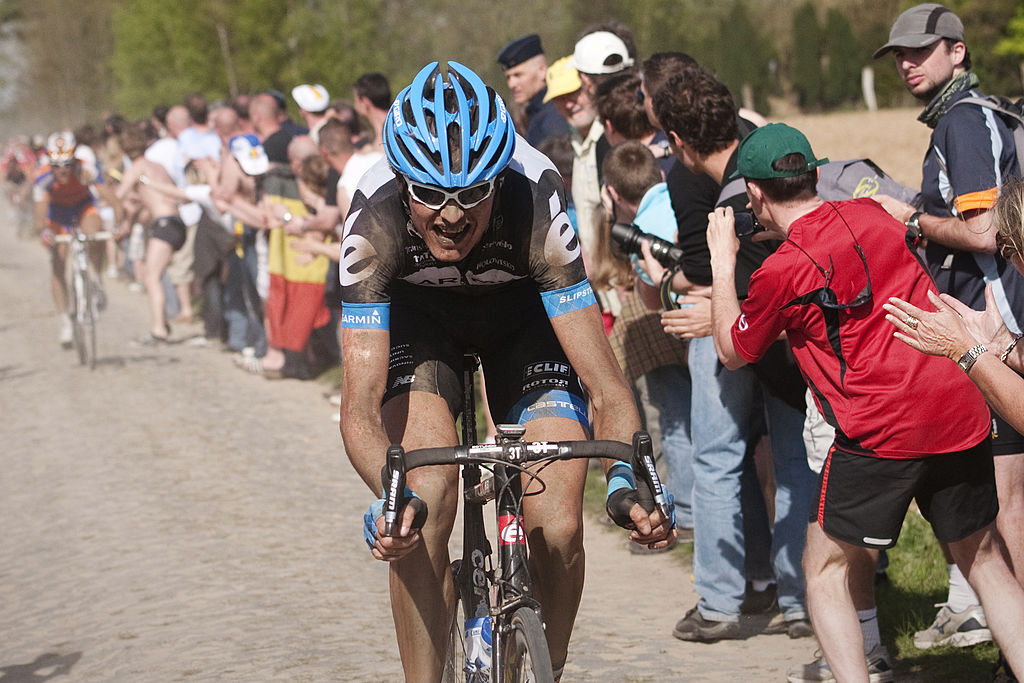
The powerful Belgian spent much of his career working for others, but his 14-year pro career will be remembered for one thing above all else – that 2011 Paris-Roubaix victory.
Standing at almost two metres tall, hailing from Flanders and possessing a big engine, Vansummeren was almost built for the Hell of the North. With Lotto, in 2008 and 2009, he showed he could compete with the best there as he took eighth- and fifth-place finishes.
But still, with all-time cobbled Classics greats Fabian Cancellara and Tom Boonen duelling year in and year out, overhauling the pair would be some feat. In the six years leading up to 2011, only one edition of the race had been won by someone other than the duo.
It would take something special to come out on top, and Vansummeren had that on April 10. While television cameras focussed on the famous image of Tom Boonen waiting for a new bike in the Arenberg Forest, up front Vancummeren was making a move with other strongmen Lars Bak, Mathew Hayman, Jürgen Roelandts, Manuel Quinziato, Lars Boom and Fréderic Guesdon.
It wasn't a group of top favourites, but the men usually considered a tier below the Boonens and Cancellaras. With 60km remaining, the group had joined up with the early break to make it 21 up front while 10km later Cancellara dropped the hammer behind.
A repeat victory for the Swiss man? It looks plausible, though few – including Vansummeren's team leader Thor Hushovd – wanted to work with him. Cancellara dragged the Norwegian and Ballan to within touching distance
That was when the free ride ended though, as Cancellara sat up and called his companion's bluff. Up front, Vansummeren took off on Carrefour de l'Arbre, while Cancellara did the same over a minute back.
Despite the Leopard-Trek man closing in, though, a chase group of Gregory Rast and Maarten Tjallingii, and a slow puncture in the closing kilometres, Vansummeren ended up with a confortable 22-second victory.
"Today simply was my dream day. Who would have dared to dream that? Vansummeren said after the race. "Last week Nick Nuyens was speechless, and now I'm speechless too. It's unbelievable. Normally one starts by winning a small race."
Vansummeren was forced to call an early end to his career in 2016 after being diagnosed with a heart problem.
| Row 0 - Cell 0 |
Chris Anker Sørensen
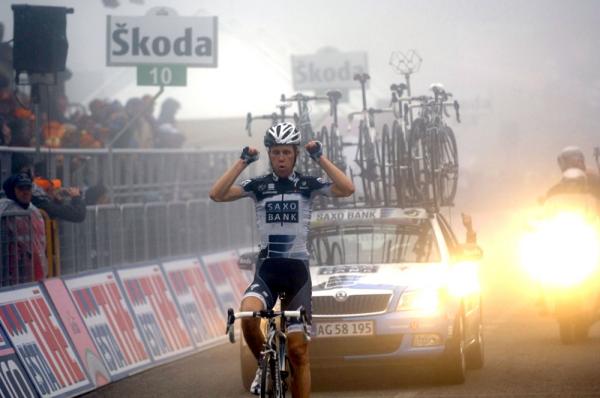
Sørensen was a loyal domestique at the CSC/Saxo Bank/Tinkoff team between 2007 and 2015, riding for the Schleck brothers, as well as Alberto Contador during the Spaniard's win at the 2014 Vuelta a España.
The Dane was a climbing super-domestique, often among the last helpers present in the lead group of Grand Tour climbing stages, and finishing four times in the top 20 of a three-week race.
Only once did he win a stage of a GT though, his chance coming at the 2010 Giro. It was the race that saw the breakthrough of his neo-pro teammate Richie Porte, who took the pink jersey from the break on stage 11 and managed to hold on to seventh overall come Verona.
The race was an unexpected success for the Danish squad, who had arrived without a clear GC leader. Sørensen's chance was there, and he grabbed it on Monte Terminillo on stage 8.
He was part of a large breakaway that got away early on in Tuscany, while the GC men, including then-race leader Alexandre Vinokourov, held fire on the race's first summit finish after a chaotic and exciting opening week.
The group of 17 hit the base of the 16km climb just over two minutes up on the peloton, with Sørensen launching first. A neo-pro Steven Kruijswijk chased him down before Simone Stortoni attacked 9km out. The Dane responded before pushing on alone into the fog.
Despite a few aggressive moves from the GC group, Sørensen's move was enough to keep everyone at bay, with the bulk of the big names coming in 56 seconds down.
Sørensen, who had come back from a broken collarbone at the Volta a Catalunya to race the Giro, went on to finish 27th at the race. He won the Danish road race title in 2015, but dedicated the remainder of his career to serving his team leaders, with opportunities to get in the break for himself coming every so often, too.
| Row 0 - Cell 0 |
Cesare Benedetti
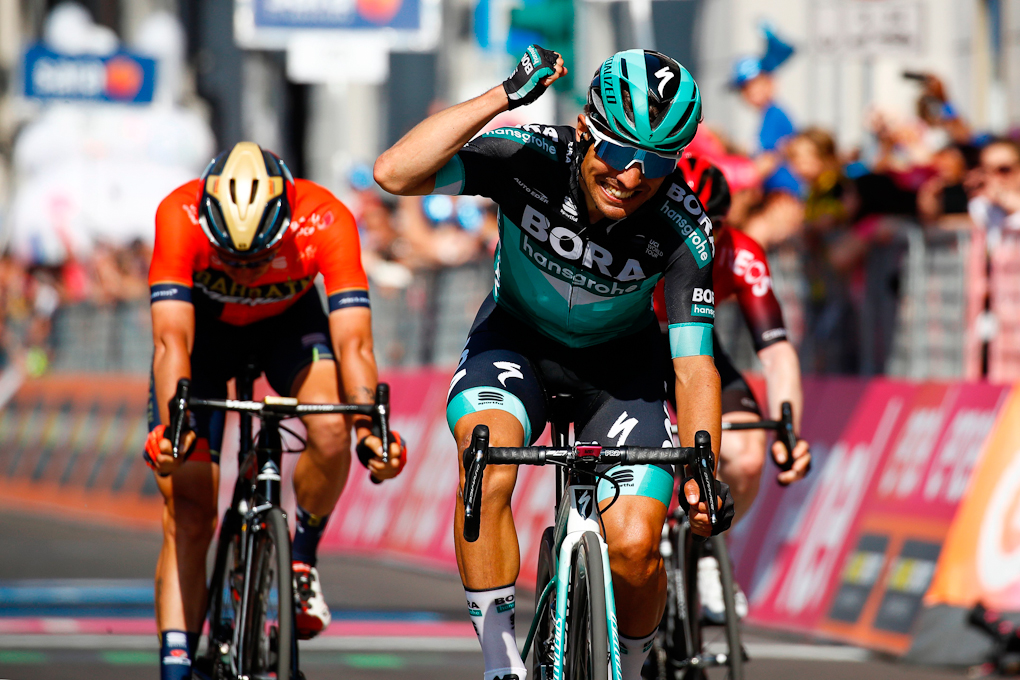
The 2019 Giro d'Italia saw breakaway after breakaway succeed, but perhaps none of the wins were as heartwarming as Benedetti's triumph in Pinerolo on stage 12. The Italian
The Bora-Hansgrohe man triumphed from the breakaway, a welcome change from chasing down the break for teammate Pascal Ackermann, as he had done during the sprint stages of the first half of the race.
After nine years as a pro, the Trentini took glory for himself after getting away with 24 other riders early on the stage, which was a possible GC flashpoint. The 9 per cent, 9km climb of Montoso, which was crested 30km from the line, saw Benedetti fall into trouble before returning to his companions on the descent, with just six men remaining out front.
He seized his chance on a small cobbled climb 3km from the finish, but was caught and passed, and once again forced on the defensive. Only managing to make it back with a few hundred metres to go, Benedetti launched his sprint almost as soon as the group hit the finishing straight.
First he passed Gianluca Brambilla, then Eddie Dunbar, and then Damiano Caruso. A first, and so far only, career victory well earned.
"I've been working so far for the others in this Giro and today I got the opportunity to get in the break and I used the chance to go 100 per cent until the end," he said after the stage.
"I'm not a talent, I'm not a winner. I would have been very happy with a good placement. I was never with the first guys on the climb, but I kept on going. I knew I could make it back on the downhill. I did the same on the final hill. I knew that the three others would probably look at each other and hesitate a bit so I used everything I had to make it back to them."
Dani Ostanek is Senior News Writer at Cyclingnews, having joined in 2017 as a freelance contributor and later being hired full-time. Before joining the team, she had written for numerous major publications in the cycling world, including CyclingWeekly and Rouleur. She writes and edits at Cyclingnews as well as running newsletter, social media, and how to watch campaigns.
Dani has reported from the world's top races, including the Tour de France, Road World Championships, and the spring Classics. She has interviewed many of the sport's biggest stars, including Mathieu van der Poel, Demi Vollering, and Remco Evenepoel, and her favourite races are the Giro d'Italia, Strade Bianche and Paris-Roubaix.
Season highlights from 2024 include reporting from Paris-Roubaix – 'Unless I'm in an ambulance, I'm finishing this race' – Cyrus Monk, the last man home at Paris-Roubaix – and the Tour de France – 'Disbelief', gratitude, and family – Mark Cavendish celebrates a record-breaking Tour de France sprint win.